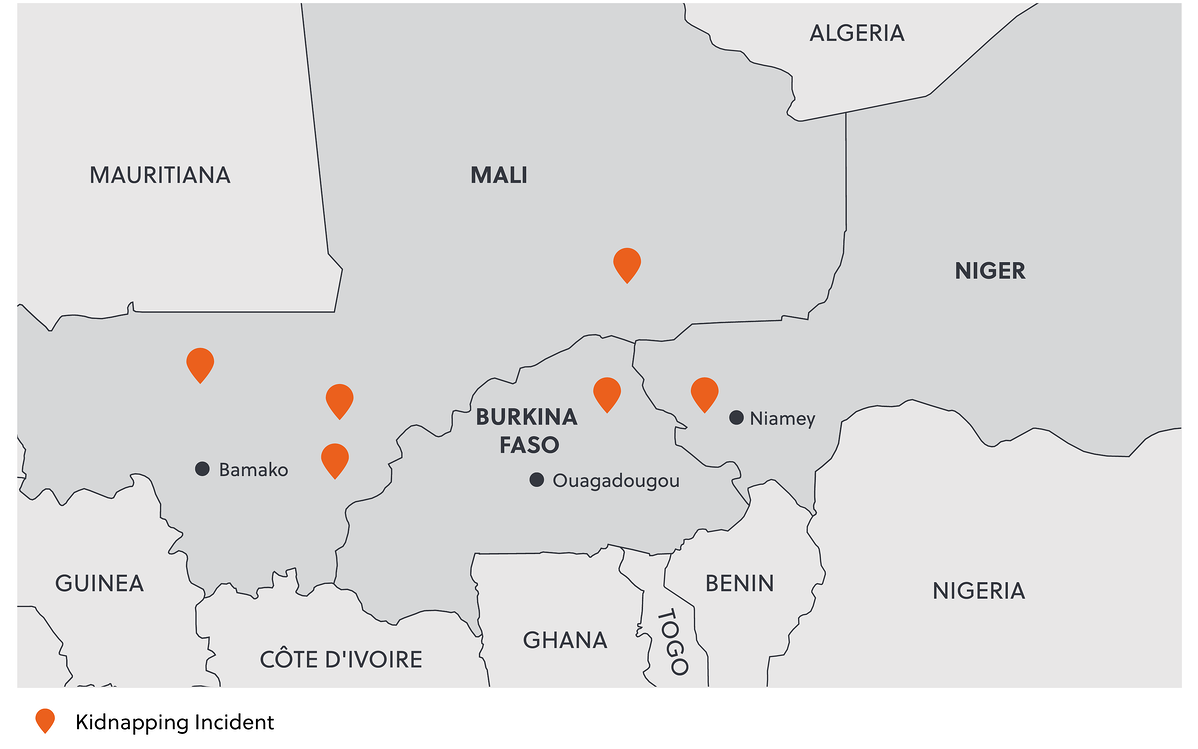No let-up in sight: Kidnapping in the Sahel
Kidnapping as a source of income for terrorist groups and organised crime networks is nothing new for the Sahel, but the rising number of incidents in 2021 and the first half of 2022 is cause for concern. Although most cases involve locals, foreign nationals continue to be targeted. In April, an American nun was kidnapped in Namentaga Province in Burkina Faso. While four foreign nationals, including three Italians and one Togolese, were kidnapped in Mali’s Sikasso Region in May. Mali, Niger and Burkina Faso are at the heart of the increasing trend. With entrenched criminal networks and deepening insurgencies in the three states, for now, it seems the trend will continue in the wrong direction.
THE DEEPENING POLITICAL AND SECURITY CRISIS
There is a strong correlation between the rise in kidnapping incidents and the deteriorating political and security landscape in the Sahel. The economic fallout from the Covid-19 pandemic, political instability, the proliferation of ethnic conflict and the withdrawal of French counter-terrorism forces in Mali have allowed Islamist militant groups to infiltrate local communities and increase their operational presence across the region. As a result, jihadist insurgencies have spread in the Sahel, and so has the threat of kidnapping.
In Mali, kidnapping trends have mirrored the southern shift of violence. The northern part of the country, which historically had a limited state presence, was the traditional hotspot for kidnappings. It was also a haven for kidnappers to keep foreign hostages captive while they negotiated ransom payments with foreign governments or the victims’ families. However, the changing security situation in Mali has led to a shift in abduction patterns. According to the Armed Conflict Location & Event Data Project (ACLED), since 2017, 62 percent of kidnappings have occurred in the southern Mopti and Ségou regions where Islamist militant groups are now most active.
Burkina Faso and Niger paint a similar picture to Mali, with an uptick in Islamist militant activity in both countries. In Burkina Faso, attacks on civilians and state targets by Jama'a Nusrat Al Islam Wal Muslimin (Group for the Support of Islam and Muslims, JNIM) more than doubled in 2021 compared to 2020. The group has also already carried out numerous kidnappings of locals and several foreigners along the Mali and Niger borders in the Nord, Sahel, Boucle du Mouhoun and Est Regions, as well as the Centre- Nord region. Niger has also reported a similar rise in violence against civilians carried out by the Greater Sahara faction of the Islamic State West Africa Province (ISWAP-GS), as well as various kidnapping incidents in the west of the country. Considering the tactics already used by the Islamist militant groups in the Sahel, it is likely they will continue to exploit and expand their use of kidnapping as a source of income in the future.

THE ENDURING THREAT OF CRIMINAL NETWORKS
The deepening political and security vacuum within the Sahel has also allowed organised criminal networks to extend their reach and further entrench themselves within the region. The Sahel comprises many illicit economies, including human trafficking networks. The worsening security situation in the Sahel boosts these networks and facilitates further cooperation between terrorist groups and local or transnational organised crime groups. This nexus of organised crime and terror has led to a situation where unidentified groups reportedly carry out abductions before selling the victims on to terrorist groups such as JNIM.
THE DANGERS FOR FOREIGN NATIONALS
Despite the overwhelming majority of kidnapping victims coming from local communities, the threat to foreign nationals remains. Most foreign governments have announced advisories against travel to parts of Mali, Burkina Faso and Niger, meaning the number of travellers entering these countries is likely limited and the opportunity for kidnappings targeting foreign nationals has reduced. But this does not necessarily represent a reduced threat. Foreign nationals typically secure higher ransom payments than locals and will continue to be a priority target for terrorist groups and organised criminals. Neither governments nor private kidnap responders typically disclose the details of negotiations with kidnappers, but ransom payments continue to be a lucrative source of income for groups in the region, with fees commonly ranging from USD 4 to 10 million. The victim profile remains varied too, with missionaries, mine employees and aid workers targeted over the last year. Robust security measures are therefore imperative to ensure the safety of a company or organisation’s personnel when travelling to the Sahel. However, given the volatile and dynamic security situation on the ground, even the most well-prepared security team cannot entirely mitigate the threat.
THE ROUGH ROAD AHEAD
There is unlikely to be an improvement in the security situation in the Sahel for the foreseeable future, and as a result, the threat of kidnapping will endure. The insurgencies have proven resilient to counter-terrorism efforts and militant groups are adept at exploiting ungoverned spaces in the vast expanses of sparsely populated territory. Combined with established criminal networks, weak governance and high ransom payments, foreign nationals will continue to be favoured targets for the myriad groups that carry out kidnappings in the region.
